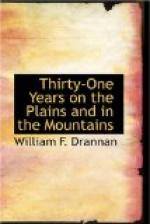We arrived at camp that evening just at dark. During our absence a train of emigrants consisting of twenty-one wagons had camped near our quarters. They wanted an escort of twenty or twenty-five men to accompany them to Port Yuma, which they were willing to board free of charge while on the trip.
Those emigrants were from Dallas, Texas, and apparently well-to-do people. On learning that the Lieutenant was out on a scouting tour, they prepared a nice supper for the three of us. The following morning the Lieutenant detailed twenty men in charge of a sergeant, to escort the emigrants to Fort Yuma. George Jones went along as a scout and I remained with the command. They were ten days making the trip, as the emigrants having ox teams, traveled slowly. On the return of the escort the Lieutenant concluded to move some fifty miles south on this road, where we made our headquarters while we remained in this section of country, being on a tributary of the Grand river, which runs down through the western part of New Mexico.
One day while I was out on a scouting tour I ran on to a little band of Navajo Indians on their way to the St. Louis Mountains for a hunt. They had some blankets with them of their own manufacture, and being confident that the Lieutenant had never seen a blanket of that kind, I induced them to go with me to our quarters to show their blankets to the Lieutenant and others as well. I told the Lieutenant that he could carry water in one of those all day and it would not leak through. We took one of them, he taking two corners and I two, and the third man poured a bucket of water in the center of it, and we carried it twenty rods and the water did not leak through it. The Lieutenant asked how long it took to make one of them, and the Indian said it took about six months. He bought a blanket for five dollars, being about all the silver dollars in the command. The blanket had a horse worked in each corner, of various colors, also a man in the center with a spear in his hand. How this could be done was a mystery to all of us, as it contained many colors and showed identically the same on both sides.




